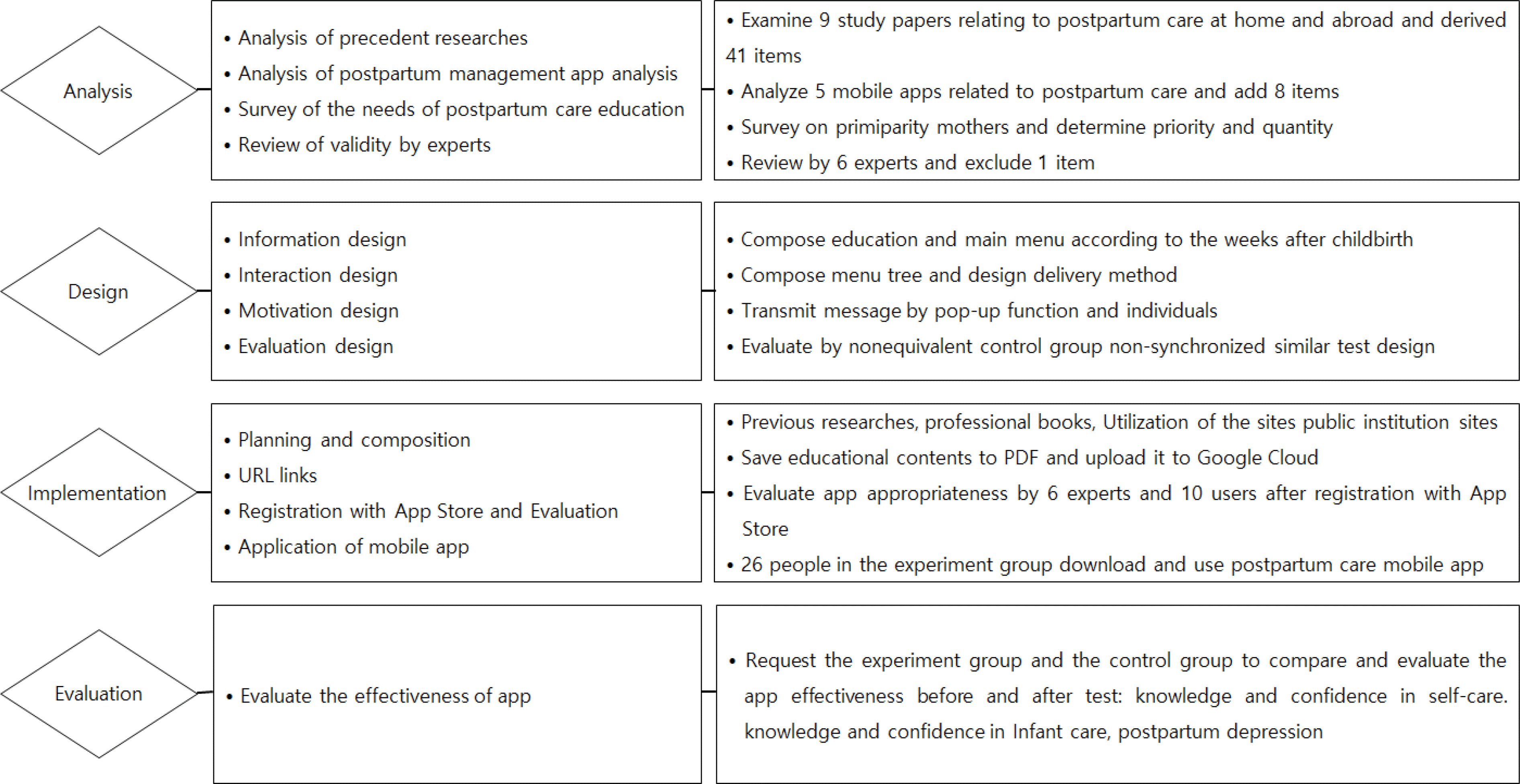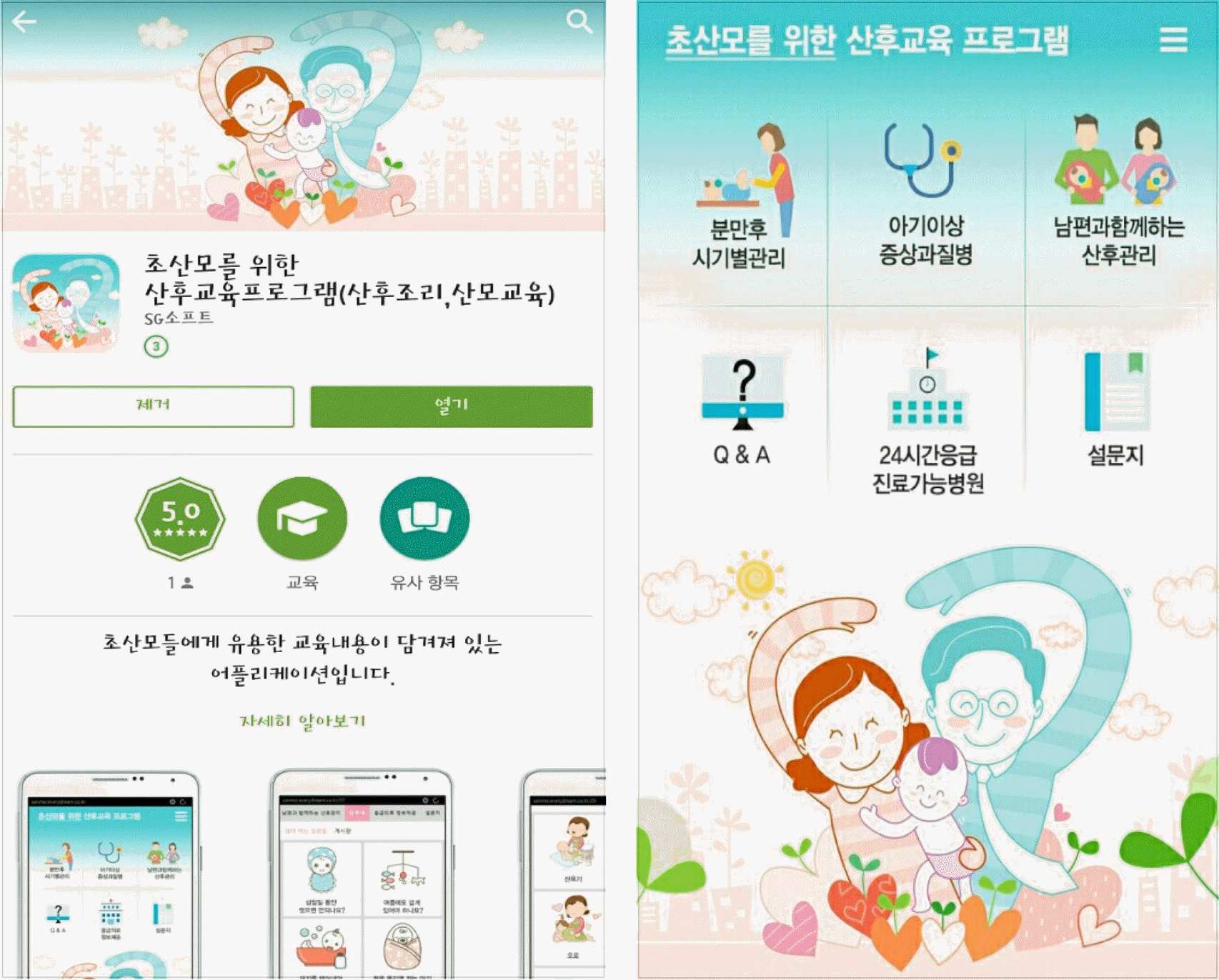Abstract
Purpose
The aims of the study were to develop mobile application for postpartum care of first-time mothers and to validate it's effect.
Methods
Using a nonequivalent control group pretest-posttest design, 52 first-time mothers were recruited (26 each in experimental and control) and the experimental group used the mobile application for 6 weeks after delivery. Postpartum self-care knowledge and confidence, infant care knowledge and confidence, and postpartum depressive mood (Edinburgh Postnatal Depression Scale) were measured before discharge from the hospital and 6 weeks later.
Results
Women who have used the postpartum care mobile application reported higher levels of postpartum self-care knowledge (p=.030) and confidence (p=.023) infant care knowledge (p=.001) and confidence (p=.004), while scores of postpartum depression (p=.021) were lower than those in the control group.
REFERENCES
1. Song JE, Ahn JA. Effect of intervention programs for improving maternal adaptation in Korea: Systematic review. Korean Journal of Women Health Nursing. 2013; 19(3):129–141.

2. Oh HE. The relationship among maternal identity, role attainment and postpartum depression. Journal of the Korean Society of Maternal and Child Health. 2001; 5(2):255–266.
3. Wang HJ, Park HS, Kim IO. Comparison of prenatal health management state and educational needs for pregnant women with advanced maternal age and under the age of 35. Korean Journal of Women Health Nursing. 2013; 19(4):230–241.

4. Barr JA. Postpartum depression, delayed maternal adaptation, and mechanical infant caring: A phenomenological hermeneutic study. International Journal of Nursing Studies. 2008; 45(3):362–369.

5. Millis JB, Kornblith PR. Fragile beginnings: Identification and treatment of postpartum disorders. Health & Social Work. 1992; 17(3):192–199.

6. Yoo EK, Kim MH, Kim HJ, Nam SY, Jung ES, Kim YC, et al. Evaluation of Korean internet websites for postnatal care (San-hujori). Korean Journal of Women Health Nursing. 2006; 12(4):282–290.
7. Statistics Korea. 2013 current status of mobile phone by year [internet]. Seoul: Author;2015. [cited 2017 August 1]. Available from:. http://kosis.kr/statHtml/statHtml.do?orgId=154&tblId=DT_MOGE_3020400226&conn_path=I2.
8. Seo YM, Lee YJ. Analysis of educational smartphone applications and mobile educational services trends. The Journal of Korean Association of Computer Education. 2010; 14(2):9–13.
9. KwaK YH, Lee ML. The effects of education on knowledge and confidence in postpartal self-care and newborn baby care. Korean Journal of Women Health Nursing. 1996; 2(2):246–256.
10. Cox JL, Holden JM, Sagovsky R. Detection of postnatal depression. development of the 10-item Edinburgh Postnatal Depression Scale. The British Journal of Psychiatry. 1987; 150(6):782–786.
11. Han KW, Kim MJ, Park JM. The Edinburgh postnatal depression scale, Korean version: Reliability and validity. Journal of the Korean Society of Biological Therapies in Psychiatry. 2004; 10(2):201–207.
12. Jin ML. Development and evaluation of health care smart phone application evaluation tool [master's thesis]. Seoul: Seoul National University;2014. p. 65.
13. Joo EK, Yoo EK. Husbands' awareness of sanhujori, needs for education and family strength. Korean Journal of Women Health Nursing. 2015; 21(2):93–105.
14. Lim JA, Yoo EK. A study on the effects of father class upon father's level of knowledge and confidence about postpartal woman and newborn care. Korean Journal of Women Health Nursing. 2002; 8(3):345–357.

15. Yang MS, Kim IS. A study on the self-confidence and nursing needs of maternal role performance in primiparas during postpartum period. Journal of the Korean Society Maternal and Child Health. 2003; 7(1):19–32.
16. Yoo EK, Lee MY, Kim JH, Sin CK, Yoo SJ, Ji SK. A study on the women's need during early postpartum. Korean Journal of Women Health Nursing. 2000; 6(3):439–452.
17. Yoo YJ. A study on the home health care needs of postpartum women. Korean Journal of Women Health Nursing. 2001; 7(4):579–595.

18. Chung AK. Development of a mobile platform to support self regulated learning. The Journal of Korean Association of Computer Education. 2009; 12(4):23–34.
19. Choi YS, Jo HS, Jang SB, Jang CJ, Choi YJ, Lee NH, et al. Women's health nursing. 8th ed.Seoul: Soomoonsa;2012. p. 605.
20. Korea society of obstetrics and gynecology. Obstetrics. 5th ed.Seoul: Koonja Publishing Company;2015. p. 1128.
21. Ministry of Health & Welfare. National health information portal [Internet]. Sejong: Author;2015. [cited 2016 February 20]. Available from:. http://health.mw.go.kr/Main.do.
22. Wang HJ, Kim lO. Effects of a mobile web-based pregnancy health care educational program for mothers at an advanced maternal age. Journal of Korean Academy of Nursing. 2015; 45(3):337–346.

23. Park MK, Lee YS. Effects of a postpartum care program on the knowledge and behavior of postpartum recovery in primiparous women. Journal of the Korean Society of Maternal and Child Health. 2006; 10(2):127–136.
24. Kim EH, Lee EJ, Kim MJ, Park DY, Lee SH. Effects of an educational program of pregnancy and delivery on pregnancy related knowledge, newborn care knowledge, and postpartum care self-efficacy of marriage immigrant women. Journal of Korean Academy of Nursing. 2010; 40(1):78–87.

25. Kim HK, Jeong IS. Effects of a newborn care education program on newborn care confidence and behavioral accuracy of primiparas in a postpartum care center. Journal of Korean Academy of Nursing. 2007; 37(1):125–134.

26. Lee HJ, Lee SA, Kim MH, Kim YH, Park NH. A study of parental knowledge and confidence in newborn care. Child Health Nursing Research. 2004; 10(3):262–271.
27. Chae MY, Hwang MS. The effects of home care nursing based maternal role strengthening programs on the maternal identity and confidence of maternal role on first-time mothers. Journal of Korean Academic Society of Home Care Nursing. 2011; 18(2):88–98.
Table 1.
Demographic and Obstetric Characteristics of Postpartum Women between Two Groups (N=52)
| Characteristics | Categories | Exp. (n=26) | Cont. (n=26) | x2 or t | p |
|---|---|---|---|---|---|
| n (%) or M±SD | n (%) or M±SD | ||||
| Maternal age (year) | 25~29 | 10 (38.5) | 12 (46.2) | -1.86 | .068 |
| 30~34 | 16 (61.5) | 14 (53.8) | |||
| Maternal education† | High school | 4 (15.4) | 1 (3.8) | 0.62 | .536 |
| University | 19 (73.1) | 23 (88.5) | |||
| Graduate school | 3 (11.5) | 2 (7.7) | |||
| Maternal religion | Yes | 8 (30.8) | 8 (30.8) | 0.00 | 1.000 |
| No | 18 (69.2) | 18 (69.2) | |||
| Maternal occupation | Yes | 11 (42.3) | 11 (42.3) | 0.00 | 1.000 |
| No | 15 (57.7) | 15 (57.7) | |||
| Living together† | Husband | 25 (96.2) | 24 (92.3) | 0.34 | .738 |
| Parents of husband | d - | 1 (3.8) | |||
| Parents of woman | 1 (3.8) | 1 (3.8) | |||
| Prenatal education received | Yes | 19 (73.1) | 16 (61.5) | 0.88 | .385 |
| No | 7 (26.9) | 10 (38.5) | |||
| Postnatal education received | Yes | 10 (38.5) | 8 (30.8) | 0.57 | .569 |
| No | 16 (61.5) | 18 (69.2) | |||
| Type of delivery | Vaginal birth | 11 (42.3) | 16 (61.5) | -1.39 | .172 |
| Cesarean birth | 15 (57.7) | 10 (38.5) | |||
| Method of pregnancy† | Spontaneous | 23 (88.5) | 25 (96.2) | -1.03 | .307 |
| Artificial | 3 (11.5) | 1 (3.8) | |||
| Baby gender | Male | 15 (57.7) | 13 (50.0) | 0.55 | .587 |
| Female | 11 (42.3) | 13 (50.0) | |||
| Birth weight (kg) | 3.28±0.50 | 3.31±0.39 | 0.24 | .809 | |
| Gestational age (week) | 39.47±1.23 | 39.00±57.00 | 0.31 | .760 |
Table 2.
Differences in Study Variables at Pretest between Two Groups (N=52)
Table 3.
Differences in Postpartum Self Care Knowledge and Confidence, Infant Care Knowledge and Confidence, and Postpartum Depression between Two Groups (N=52)




 PDF
PDF ePub
ePub Citation
Citation Print
Print




 XML Download
XML Download